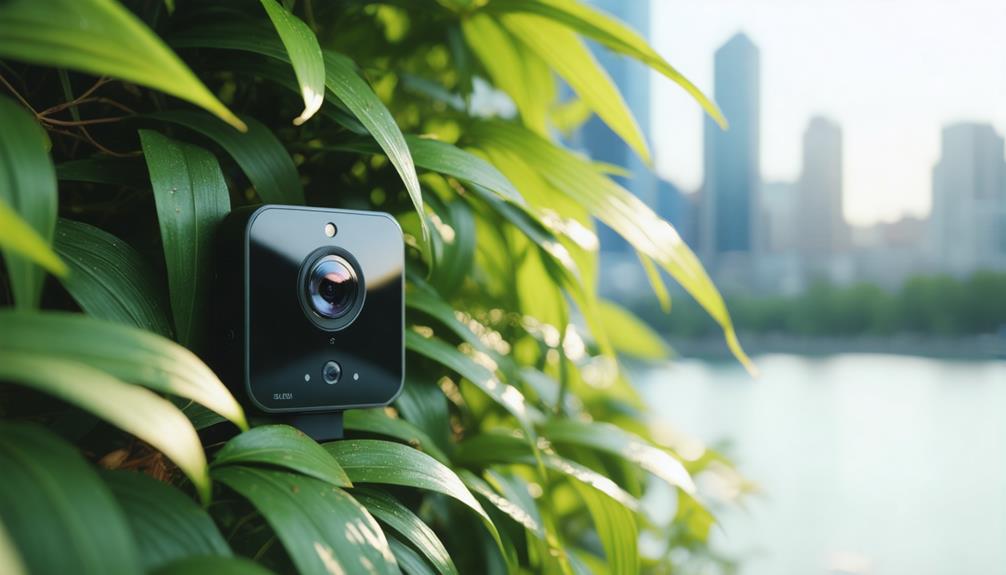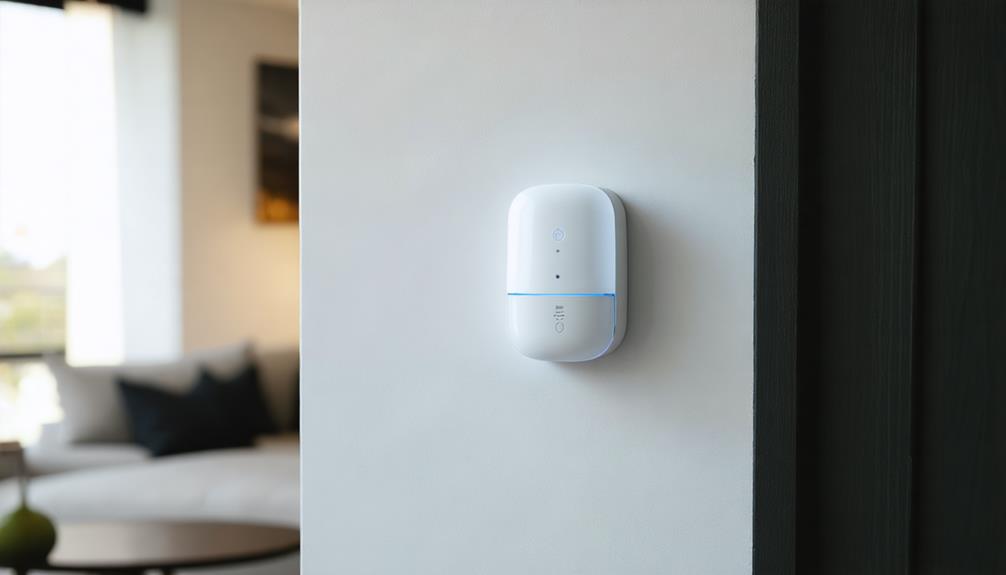
Brainstorm Security Shop

For Orders Over $199

On Any Of Our Products

Details On Refund Page
When you think about home security, an alarm sensor likely come to mind as essential tool in protecting your space. These sensors, whether they’re monitoring motion or checking for door breaches, play a pivotal role in your overall safety strategy. Understanding how home alarm function and the various types available can significantly enhance your security setup. But what happens when these systems encounter issues, or how can you future-proof your alarm sensors? The answers might surprise you.
When it comes to securing your space, understanding the different types of alarm sensors is crucial. These sensors are the backbone of any effective security system, and knowing their varieties helps you make informed decisions.
There are several sensor technologies available, each designed for specific security needs. Motion detectors, for example, use infrared technology to sense movement within a designated area. They’re great for monitoring larger spaces and can often be integrated with other devices in your alarm system.
Door and window sensors are another common type. They trigger an alarm when a door or window opens unexpectedly, providing an immediate alert to potential intrusions.
Glass break sensors can also be employed, detecting the sound or vibration of breaking glass, which is particularly useful for homes with many windows.
Integrating these sensors into your alarm system ensures comprehensive coverage. You can combine different types to create a robust security network tailored to your environment. By understanding these various alarm sensors, you’re better equipped to enhance your protection and maintain peace of mind.
Understanding how alarm sensors work is essential for anyone looking to enhance their security system. Alarm systems rely heavily on sensor technology to detect potential threats, whether it’s motion, sound, or environmental changes. When you install these sensors, they continuously monitor their surroundings.
Motion detectors, for instance, use passive infrared sensors to sense body heat. When someone enters the monitored area, the sensor triggers an alarm.
Similarly, door and window sensors utilize magnetic fields; if a door or window opens, the circuit breaks, setting off the alarm.
Sound sensors can pick up specific noises, like glass breaking, while smoke detectors monitor for harmful smoke particles in the air. Each type of sensor communicates with the central alarm system, sending real-time alerts to keep you informed.
Moreover, advanced alarm systems combine multiple sensors to create a comprehensive security network. This integration means you’re not just relying on one type of sensor but a collaborative effort to keep your property secure. Understanding these mechanisms helps you choose the right alarm sensors, ensuring your security system meets your specific needs effectively.
Alarm sensors offer numerous advantages that significantly enhance your security measures. One key benefit is the ability for remote monitoring. You can check your home’s status anytime, anywhere, ensuring peace of mind while you’re away.
Additionally, alarm sensors often come with energy-efficient features, reducing your overall utility costs. This means you can keep your home secure without breaking the bank.
Here’s a quick overview of the benefits:
| Benefit | Description |
|---|---|
| Remote Monitoring | Access your alarm system from anywhere via mobile apps. |
| Energy Efficiency | Save on energy bills by using smart technology. |
| Quick Response Times | Alarm sensors alert you instantly to any breaches. |
| Customizable Alerts | Set alerts to suit your lifestyle and preferences. |
| Enhanced Property Value | Increase your home’s value with a security system installed. |
Incorporating alarm sensors into your security system can provide you with both safety and savings. It’s a smart investment, giving you control and efficiency that traditional security methods just can’t match.
When installing alarm sensors, choosing the right location is crucial for optimal performance.
You’ll also need to consider wiring and connectivity to ensure everything functions smoothly.
Let’s explore these key aspects to get your system up and running effectively.
Selecting the right location for your alarm sensors is crucial for maximizing security and ensuring effective monitoring. Start by considering sensor placement in areas with high foot traffic or potential entry points, like doors and windows. These locations will help you catch any unauthorized access right away.
You also want to avoid interference from objects that could obstruct the sensor’s line of sight or functionality. Keep sensors away from large furniture, plants, or electronic devices that might create false alarms or diminish the sensor’s effectiveness.
For motion detectors, it’s wise to mount them high on walls, ideally around 6 to 8 feet off the ground, to cover more ground and reduce the chance of obstructions.
Additionally, think about the environment. Avoid places with extreme temperatures or direct sunlight, as these conditions can impact performance. If you’re installing outdoor sensors, ensure they’re sheltered from harsh weather while still having a clear view of the monitored area.
Properly wiring and connecting your alarm sensors is essential for ensuring they function correctly and reliably. Start by considering sensor positioning; make sure each sensor is placed where it can effectively monitor the area you want to secure.
Next, be mindful of compatibility issues. Check if your sensors match the wiring specifications of your alarm system. Here’s a quick reference table to help you:
| Sensor Type | Wiring Requirement |
|---|---|
| Motion Detectors | 2-Wire Connection |
| Door/Window Contacts | 3-Wire Connection |
| Glass Break Sensors | 4-Wire Connection |
| Smoke Detectors | 2-Wire Connection + Power |
When connecting your sensors, always use high-quality wires to prevent signal interference. Ensure that connections are tight and secure to avoid false alarms. Test each sensor after installation to confirm it responds correctly. Following these tips will help you achieve a robust and efficient alarm system, giving you peace of mind in your home security.
Regular maintenance and troubleshooting of your alarm sensor are crucial for ensuring its optimal performance. You’ll want to start with regular sensor testing to confirm everything’s working properly. Make it a habit to check your system monthly, ensuring all sensors respond correctly.
Next, pay attention to your sensor calibration. If your sensors aren’t calibrated correctly, they may not detect activity as intended. Adjust them according to the manufacturer’s instructions, and consider professional help if you’re unsure.
Don’t forget about the sensor battery! Weak batteries can lead to false alarms or complete system failures. Check the battery status regularly and replace it as needed to keep your system reliable.
As you look ahead, advancements in sensor technology are set to transform how alarm systems function.
You’ll see greater integration with smart home devices, making your security experience more seamless than ever.
Plus, enhanced features will offer you peace of mind, ensuring your home is safer and smarter.
Harnessing the latest innovations, alarm sensors are rapidly evolving to enhance security and user experience. You’ll notice that advancements in sensor technology focus on improving sensor accuracy and reliability.
Modern sensors now utilize sophisticated algorithms and machine learning to reduce false alarms, ensuring that when an alert is triggered, it’s genuine.
These advancements mean that you can trust your alarm system more than ever before. For instance, enhanced motion detectors can differentiate between pets and intruders, cutting down on unnecessary alerts and giving you peace of mind.
Moreover, the integration of advanced materials and manufacturing techniques has led to sensors that not only perform better but also last longer. You won’t have to worry about frequent replacements or maintenance, which can be a hassle.
As you explore new alarm systems, look for features that emphasize sensor accuracy and reliability. They’ll provide a more effective security solution for your home or business. With these innovations, you can feel more secure, knowing your alarm system is equipped with cutting-edge technology designed to protect what matters most.
Integrating alarm sensors with smart home systems is revolutionizing the way we think about security. You can now control and monitor your home’s safety from your smartphone, enhancing convenience and peace of mind. The synergy between alarm sensors and smart home technology allows for impressive automation capabilities, making your life easier and safer.
With this integration, you’ll enjoy:
These features not only enhance your home’s security but also provide a cohesive experience with your other smart devices. Imagine having your lights flash and doors lock automatically when an alarm is triggered. This level of integration ensures that your home isn’t just smart, but also secure, giving you the ultimate peace of mind.
Embracing this technology means you’re stepping into a future where security is proactive and intuitive.
Enhancing security features in alarm sensors is paving the way for a safer home environment. You can now enjoy the peace of mind that comes with advanced technology, allowing you to keep an eye on your home from anywhere. With remote monitoring capabilities, you’ll receive real-time alerts and updates directly to your smartphone, ensuring you’re always connected to your home’s security, whether you’re in the next room or halfway around the world.
Moreover, many of these systems offer customizable settings, enabling you to tailor your alarm sensors to match your specific needs. You can set different sensitivity levels, adjust the notification preferences, or even schedule when the system should be active. This level of personalization means you have control over your security, ensuring it works for you rather than against you.
As technology continues to evolve, expect even more innovative features, such as AI-driven analytics that can predict potential security threats. By embracing these enhanced security features, you’re not just investing in a product; you’re investing in your home’s safety and your peace of mind.
Yes, you can integrate various sensor technology with smart home systems, enhancing smart home compatibility. This allows you to monitor your environment more effectively, automating alerts and responses for a more secure and convenient living space.
The average lifespan of a device like this is typically 5 to 10 years. To extend its life, follow maintenance tips and ensure regular battery replacement. You’ll enhance performance and reliability by keeping everything in check.
Yes, weather conditions can impact sensor performance. Extreme temperatures might trigger false alarms, so you should consider sensitivity adjustments to minimize disruptions. Keeping sensors clean and properly maintained helps ensure reliable operation despite environmental factors.
Most alarm systems don’t require a subscription service, especially with DIY installation. However, some advanced features may need one. Without it, you might face issues like false alarms, limiting your system’s effectiveness.
Yes, pets can trigger motion sensors if they’re not pet friendly sensors. You might experience false alarms with regular sensors, so consider investing in pet-friendly options to avoid unnecessary disturbances while keeping your home secure.

Brainstorm Security Shop
1867 Caravan Trail
Ste 105
Jacksonville, FL 32216
Call us toll free: (800) 859-5566